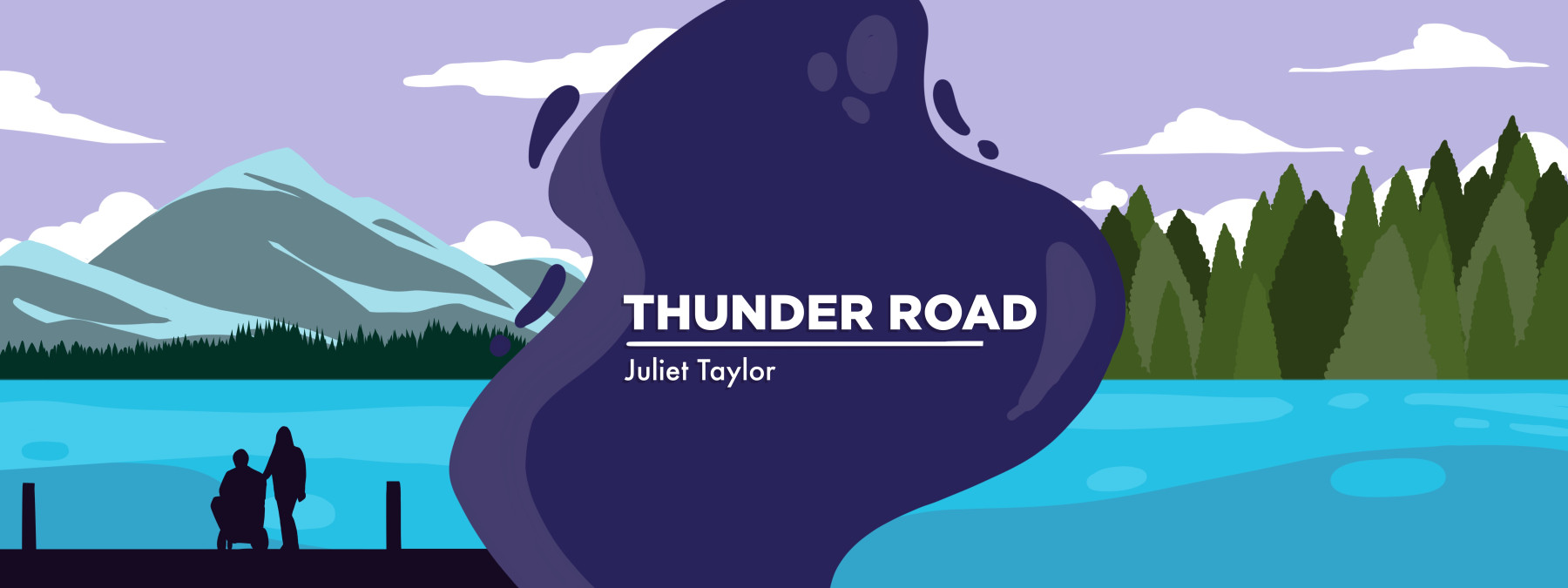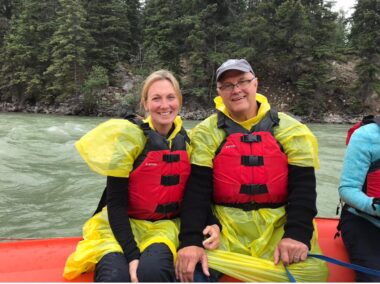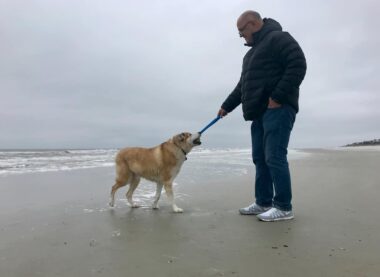How being outdoors brought peace and perspective, then and now
Spending time in nature brought comfort while living with my husband's ALS

When I look back at photos from when my late husband, Jeff, was living with ALS — something I do often to find inspiration for this column — I’m struck by how many of our happier memories took place outdoors, even in the advanced stages of Jeff’s illness.
I guess that shouldn’t surprise me. Before his ALS, we were outside all the time. When the condition became a part of our lives, we didn’t think to change that, nor was there any immediate reason to. I vividly remember the day his diagnosis was confirmed via a second opinion in Baltimore. Once we arrived home, we instinctively sought solace outside, sitting on one of the two wrought-iron patio chairs that we kept by the little pond in our yard.
Those chairs and that spot provided consistency and reassurance for us for the next year that we lived in that home. We’d start and end most of our days in those chairs, bundling up on the coldest days and soaking in the warmth on the summer ones. Our dog, Rudder, would always be with us, darting in and out of the tidal grasses, looking for fish and making us laugh. We also had our heaviest conversations out there. There was something about being outdoors that soothed both of us and also made us feel connected to something larger. I think it helped each of us find strength and perspective.
A source of comfort
I find myself thinking about the peace that being outdoors brings, as warmer days work to break through here in Maryland, where I live. Although we still seem to have more cool days than warm ones, the season reminds me of how relatively healthy it felt to be outdoors during the time that Jeff was living with ALS. Every person, every family experiencing ALS has something unique to them that brings comfort, and this was ours.

Jeff Sarnacki and Juliet Taylor enjoy a day of floating on the Athabasca River in Alberta, Canada, in June 2019. (Courtesy of Juliet Taylor)
That doesn’t mean that spending time outdoors was easy to navigate. Jeff’s symptoms had started with a foot drop, and while he was able to walk outside for a few months after his diagnosis, we quickly and progressively moved from an orthotic to a rollator, to a scooter, to a power wheelchair. We chose models that allowed for Jeff to get around more easily, but it was still unwieldy to travel with this equipment.
Jeff was eager to travel for as long as he could, and in retrospect, I observe that we chose destinations based on outdoor activities. Our most meaningful journey while living with Jeff’s ALS came about nine months after he was diagnosed, when we traveled with two of our best friends to Alberta, Canada, for 10 days of wildlife viewing. We had running contests around animals spotted: first bear, most bears in a day, and so on.
Our friends Robin and JJ knew the ins and outs of ALS very well by then, staying by our side literally and figuratively throughout his illness. Encouraged by Jeff, we pushed the limits on that trip, taking his scooter off-roading (unintentionally) in national parks and persuading a rafting company to let us float down gentle rapids, even though Jeff could no longer climb into the boat. When I look at those pictures, I see the wonder and contentment in his eyes — and in mine, too.

Jeff Sarnacki and his dog, Rudder, play on the hard-packed sand of Hilton Head, South Carolina, in February 2019. (Photo by Juliet Taylor)
On another occasion, earlier in his illness, Jeff researched beaches based on the density of the sand because he could walk more easily on packed sand than on looser, more precarious ground. It’s for that reason alone that we found ourselves in Hilton Head, South Carolina, in February, enjoying brisk walks on the beach with Rudder while Jeff was still able.
Whether it’s the change of seasons right now or the fact that next month marks the anniversary of both Jeff’s birthday and his death five days later, I’m feeling increasingly reflective about what life with ALS felt like and what it meant; what I learned and what I regret; what brought us joy and what we struggled with. In grief, I also recognize that reflecting on what brought Jeff and I joy together might also be a path to continued healing as I live without him. For this reason, I’m focused on finding more ways to enjoy the outdoors this spring.
Whether it’s being outside, taking in accessible museums, or hosting family game nights, I think it’s important to find those moments and activities, however large or small, that can bring peace and happiness while living with ALS. For me, fresh air and nature will forever remind me that even in adversity, there are places and moments that offer joy, reflection, and emotional healing.
Note: ALS News Today is strictly a news and information website about the disease. It does not provide medical advice, diagnosis, or treatment. This content is not intended to be a substitute for professional medical advice, diagnosis, or treatment. Always seek the advice of your physician or other qualified health provider with any questions you may have regarding a medical condition. Never disregard professional medical advice or delay in seeking it because of something you have read on this website. The opinions expressed in this column are not those of ALS News Today or its parent company, Bionews, and are intended to spark discussion about issues pertaining to ALS.






Alton Craig Peterson
After having ALS and not being able to drive, I begin to see Outdoors much different because I did not have to focus on the road. I could not see the Glory of all that God created in a much better way. It have been very special and wonderful for Me. This is one of many examples of how I have learned many Wonderful things having ALS. God can use all of Life here on His earth to teach Us.
Lauren Albrecht
This newsletter reminded me of my dear brother Kevin who loved the outdoors and we also found great peace there; as well as his whole family.
Thank you for sharing.